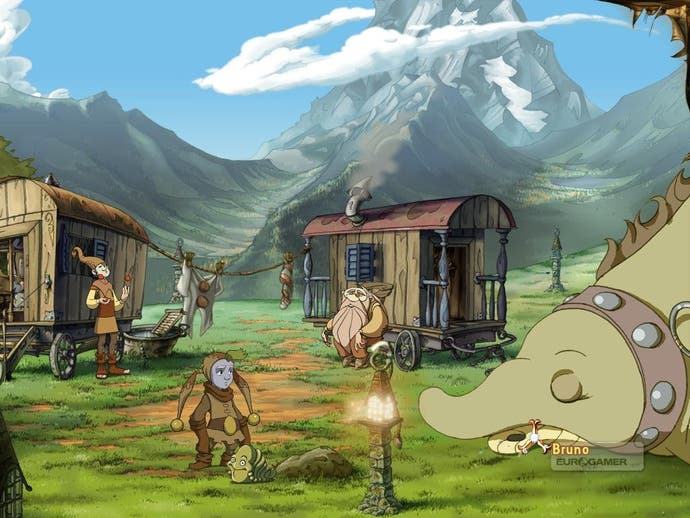The Whispered World
What?
There's a sensation familiar to anyone who knows adventure gaming well. It's that moment when you've cracked a puzzle, and the game opens up. Suddenly there are two or three new locations to explore, new objects to find, and new puzzles to solve. Those mysterious inventory items make more sense in this new context, and previous unsolved puzzles receive that vital clue.
They're fantastic moments, stepping out of dark rooms into bright light. It's probably the very hardest thing to get right in an adventure game. The Whispered World demonstrates one of the more frustrating ways to get it wrong.
Absolutely beautiful, this German adventure's world is a remarkable one. Not only is it so exquisitely painted and drawn, but it's bursting with imaginative flourishes. There are moments throughout that capture the same magic as a Studio Ghibli film. Vast, surprising creatures, strange, amorphic pets, and a maniac nature.
You play Sadwick, a misery-guts child living in a miniscule travelling circus with his mean older brother and senile grandfather. Forced to be a clown, he wishes for a better, freer life, preferably in the company of his pet caterpillar-thing, Spot.
Determined to find adventure, Sadwick's first goal is to explore the woods. And from here you might imagine you have quite a traditional fairytale beginning. Except one of The Whispered World's finest features is its defiance of such traditions.

Sadwick is an irredeemable pessimist. His absolute certainty that all is going to go wrong makes him almost disappointed when something works out. But little does. This is a story, we're told from the start, of a little clown boy who brings about the end of the world. We begin in doom.
Early on, Sadwick meets an oracle whose prophecies confirm the worst - he is to be the cause of the world's destruction. But in a beautifully told moment, he lies about this once the oracle leaves her trance. He claims to be the saviour, and sets off to rescue a world we're told he can only destroy.
These extremely bleak beginnings do not dominate the moment-by-moment game, perhaps thankfully. Generally your tasks are finding ways to open doors and gates, escape prisons, operate machinery - typical point-and-click adventure fare. Of course all of this is narrated by Sadwick, from his miserable perspective. But the world around him can be cheerful enough.
This contrast could have been one of the most splendid features, especially with the strength of the writing. Revolution's Steve Ince worked on the script ensuring its humour translated well into English. And the jokes are often fantastic, Sadwick's remarks inventively downbeat. The problem is the delivery.


